Lore:Statues/Other Statues
Other Statues[edit]
Contents
- 1 Other Statues
- 1.1 Alduin's Wall
- 1.2 Battle of the Bones Memorial
- 1.3 Broken Statue of Fanacasecul
- 1.4 Brothers of Strife
- 1.5 Bruma Warrior
- 1.6 Dragon Bridge
- 1.7 Great Statue of Irkngthand
- 1.8 The Lady in the Cistern
- 1.9 Leki's Blade
- 1.10 Mermaid of Anvil
- 1.11 The Sentinel
- 1.12 The Skyforge
- 1.13 Standing Stones
- 1.14 Ten Ancestors
- 1.15 Weeping Giant
- 2 References
Alduin's Wall[edit] | |
 Skyrim Skyrim
| |
|---|---|
|
Alduin's Wall is a large Akaviri bas-relief found within Sky Haven Temple. It is considered to be one of the best preserved examples of early Akaviri sculptural relief, as well as a wonder of the ancient world. Although Akaviri in origin, craftsmen were said to have incorporated the flowing Nordic style into its design.[1] It is noted for recording the Prophecy of the Dragonborn, which foretells five key historical events that would preface Alduin's return. The first half of Alduin's Wall depicts the historic events of the Dragon War and the banishment of Alduin by the ancient Nord heroes. The other half foretells the omens required to fulfil the prophecy.[2] Emperor Reman II granted the Akaviri Dragonguard permission to begin the construction of Alduin's Wall in 1E 2812. Its purpose was to record all of the dragonlore the Dragonguard had accumulated, and to preserve this knowledge against the forgetfulness of time. Akaviri craftsmen and artisans were summoned from temples across the Empire to build the wall and after six years it was completed. Reman II visited the Sky Haven Temple to officially dedicate the wall and consecrate the Blood Seal at the temple's entrance in the presence of all the Dragonguard of Skyrim. Despite being a wonder of the ancient world, the location of Alduin's Wall was lost over time, and its very purpose was ironically forgotten.[3][1] The wall was re-discovered by the Last Dragonborn in 4E 201 and the Blades during their quest to stop Alduin.[4] | |
Battle of the Bones Memorial[edit] | |
|
Battle of the Bones Memorial is a memorial depicting an axe wielding Nord Warrior found in the Rift, Skyrim. It marks one of Unnvald Ironhand's most well-known battles. In a pass through the Velothi Mountains, he defended Fullhelm Fort from the undead conjured by necromancers of Fort Virak, a keep on the other side of the pass in Stonefalls.[5][6] After the Battle of the Bones a memorial was built just south of Fullhelm Fort. Unnvald claimed that it was built to honor the deceased but his granddaughter believed it was made to taunt his enemies since it cannot be seen from Fullhelm Fort but is particularly visible from Fort Virak. After the battle, Unnvald left his sword, Bonebane, in a chest near the memorial, vowing to never pick it up again.[7] |
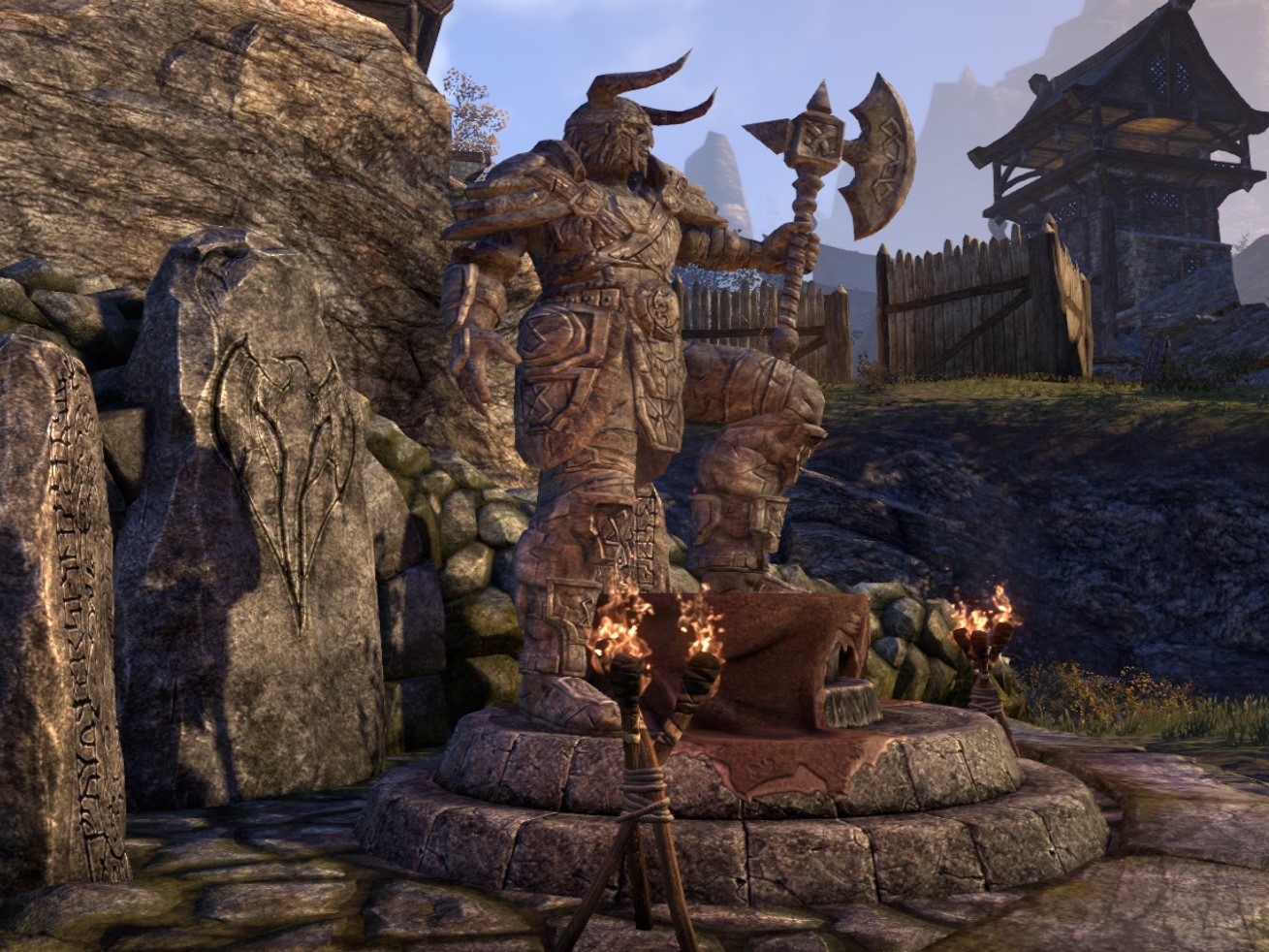 Skyrim Skyrim
|
Broken Statue of Fanacasecul[edit] | |
|
An enchanted Ayleid statue was discovered outside the ruins of Fanacasecul in Cyrodiil. The ruined sculpture contained the spirit of an Ayleid who was magically trapped inside during the reign of the Ayleids in the First Era. According to the spirit, the sculptor bore a grudge against them and bound their spirit to the statue during its unveiling. In its prime, Fanacasecul was a pleasure garden of the Ayleids, replete with flowering trees and plants. For many years the statue served as a source of amusement in these gardens and the spirit was frequently tormented by the citizenry.[8] After the defeat of the Ayleids in the First Era, Fanacasecul fell into ruins and the statue was largely destroyed except for the plinth. When it was re-discovered during the Three Banners War, the trapped spirit spoke of its sole desire to be whole again, however, to do so required a skilled sculptor.[8] At some point between the mid-Second and late Third Era the statue was indeed restored to its former glory.[9] |
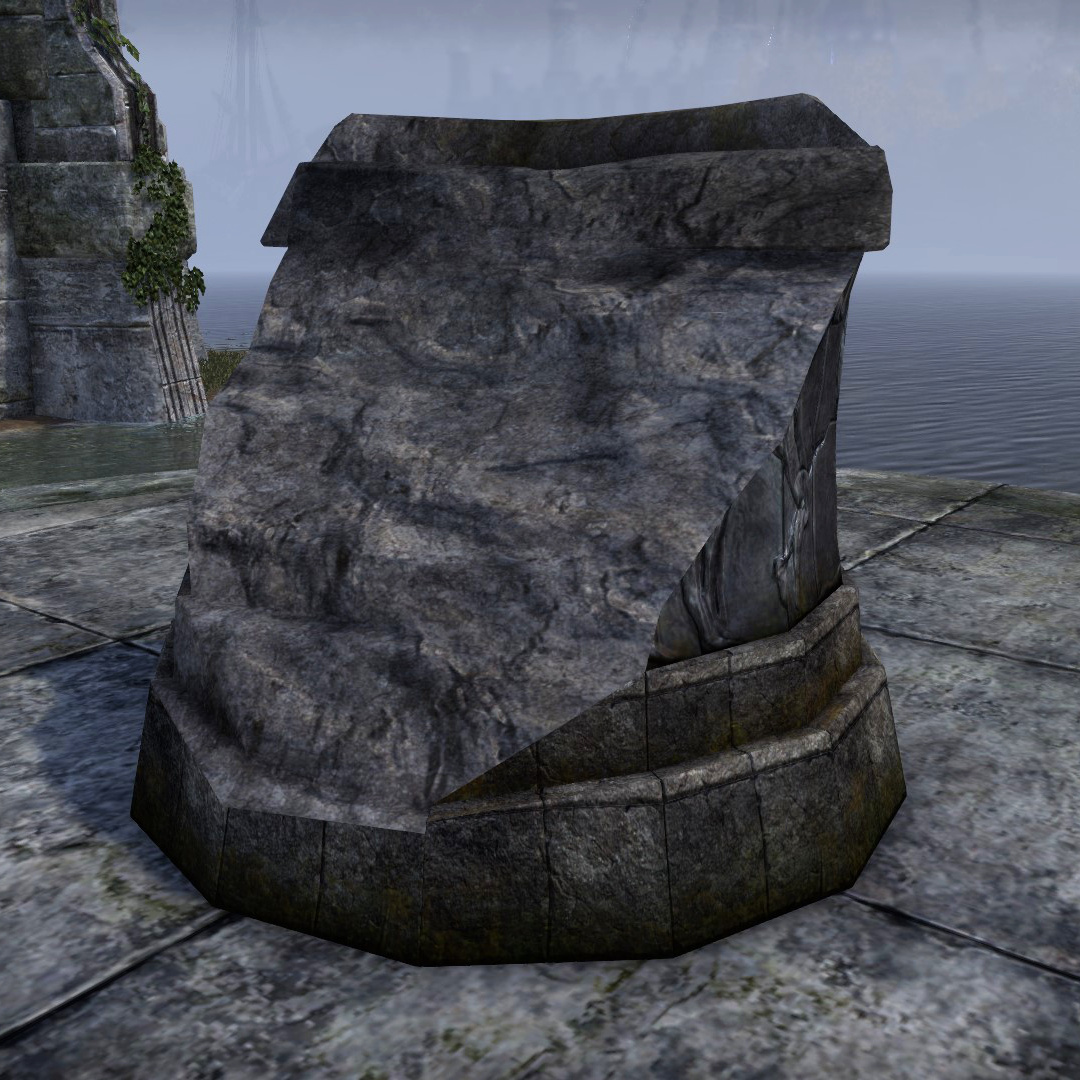 ESO ESO
|
Brothers of Strife[edit] | |
|
The Brothers of Strife is the name of the enormous stone statue towering over ancient Chimer ruins in the Stonefalls region of Morrowind. It was named after the Brothers of Strife, two Daedric creatures created there. The ruins around the statue was the location of the Chimer army's last stand after Nedes from Skyrim invaded Stonefalls in the First Era. In desperation, the Chimer sacrificed two of their leaders, General Balreth and Legate Sadal, in order to summon the Brothers of Strife. The Brothers drove the Nedes from Stonefells and the statue was later built to commemorate the Chimer's sacrifice.[10][11] In 2E 582, a researcher from House Telvanni named Sorcerer Vunal traveled to the Brothers of Strife to learn what had happened during the battle. The Vestige later helped Vunal complete his research by establishing a link to the distant past and viewing past events.[12] Around this time, large feldspar crystal sculptures and chrysolite carved bookends depicting the Brothers of Strife could be found.[13][14] |
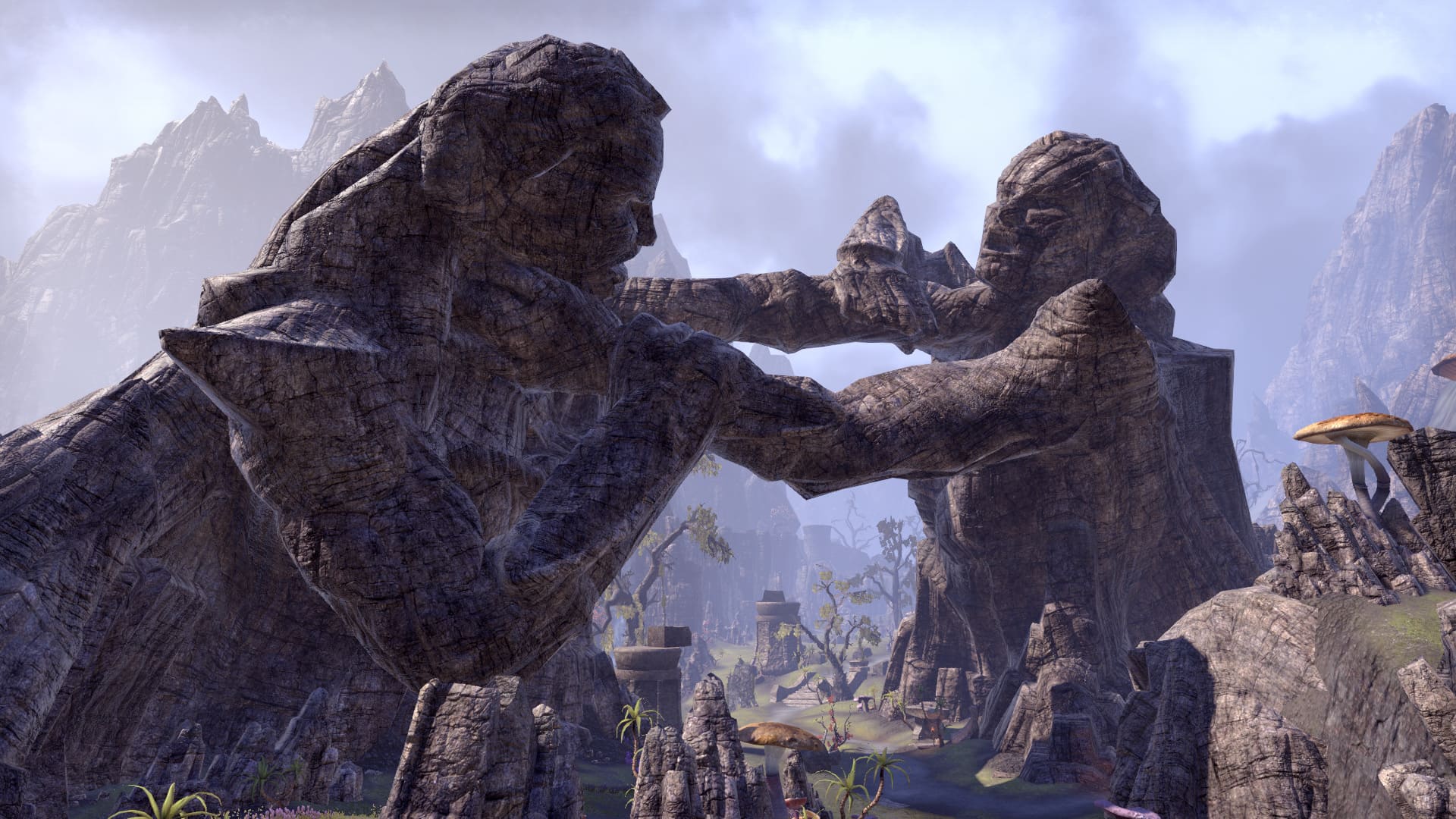 ESO ESO
|
Bruma Warrior[edit] | |
|
A large statue of an unknown Nord warrior in Imperial armor stood in the city of Bruma in Cyrodiil during the late Third Era. It depicts him shouting, likely alluding to the Nordic power of the Thu'um.[15] |
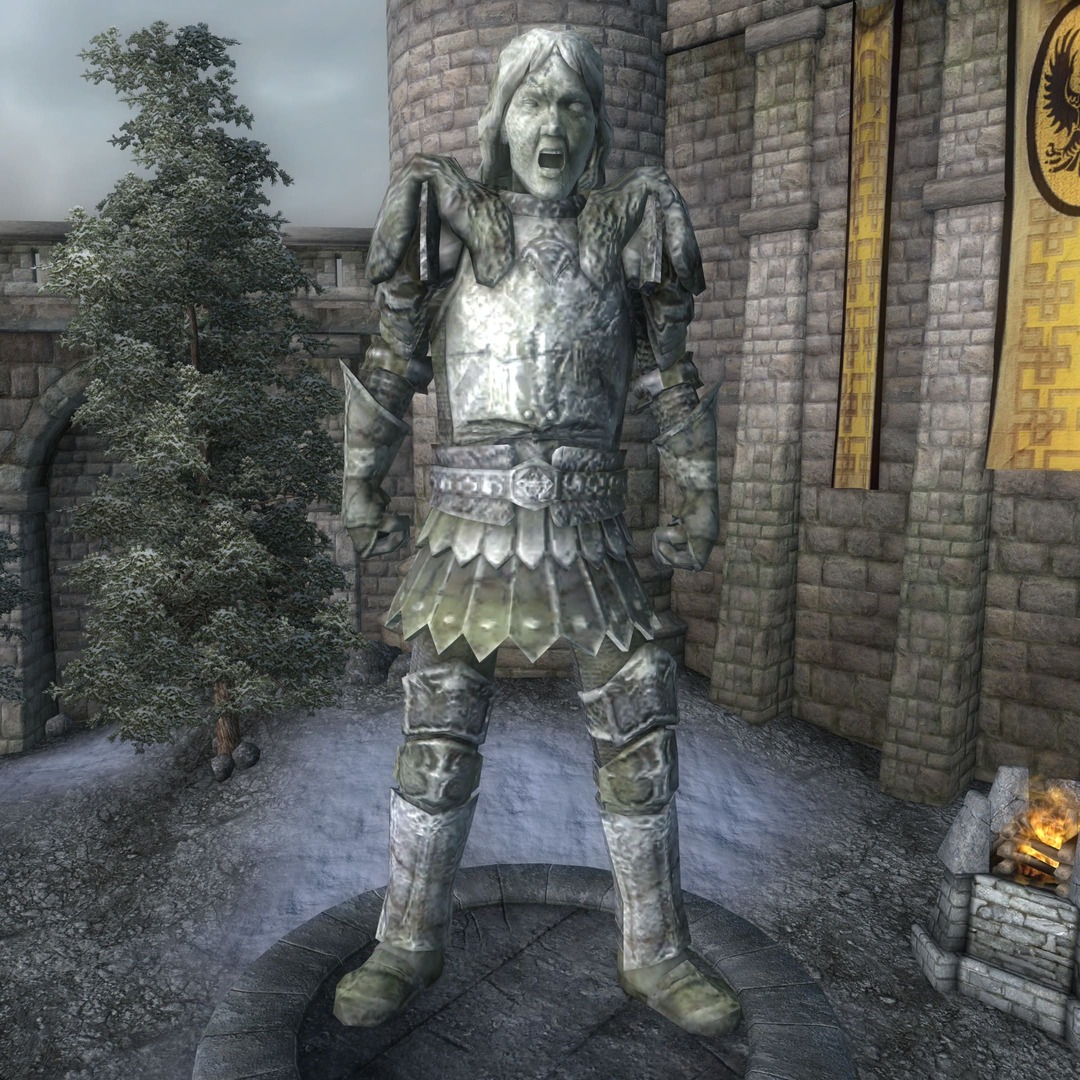 Oblivion Oblivion
|
Dragon Bridge[edit] | |
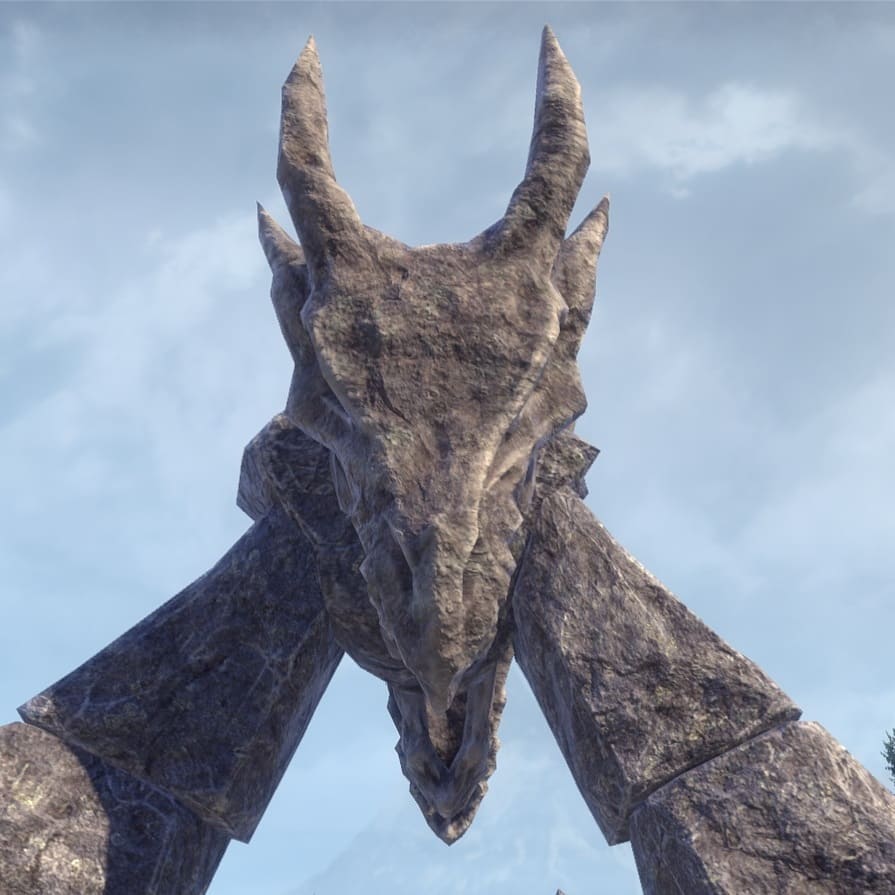 ESO ESO
|
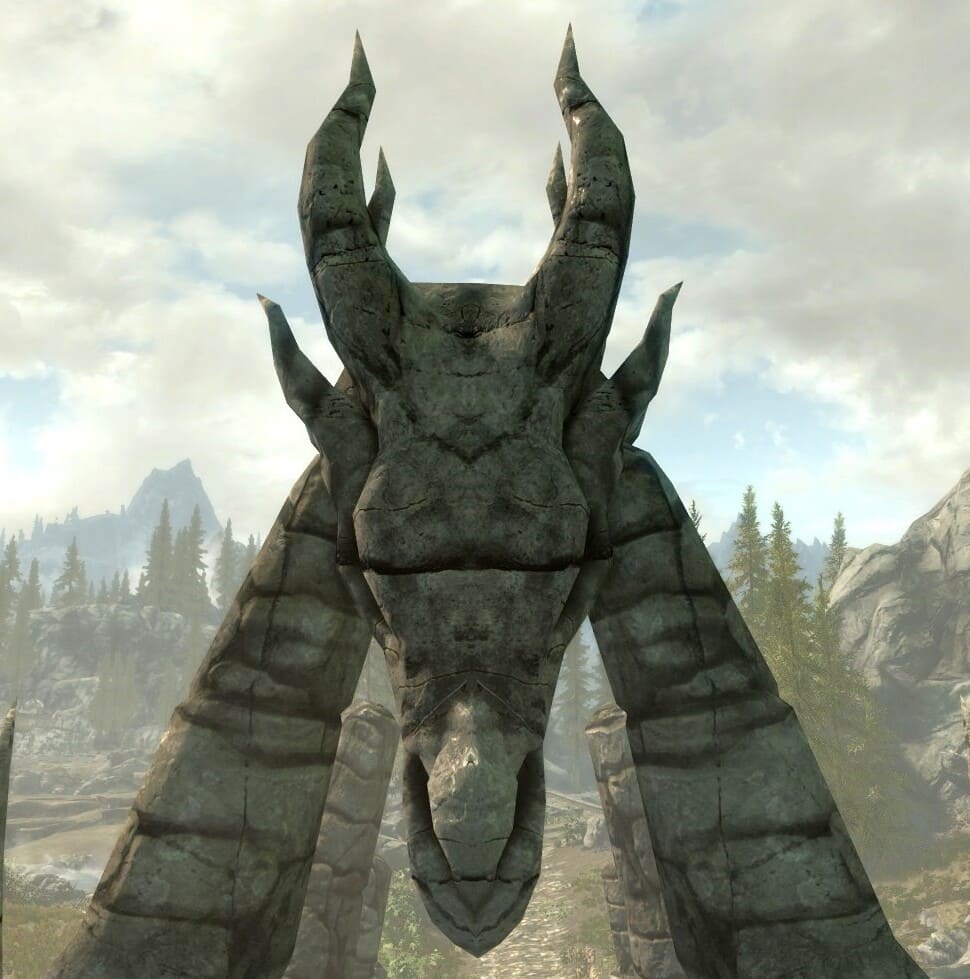 Skyrim Skyrim
|
|---|---|
|
Two large dragon skull figureheads are found back-to-back at the apex of the bridge that crosses into the Nordic town of Dragon Bridge in Skyrim. The ancient and ornate bridge predates the settlement by untold years, and some scholars believe the skulls are in fact petrified skulls of actual dragons, due to the difference in stonework detail between the bridge's stone and the skulls. Other scholars however deride this as "poetic nonsense". Dragon Bridge is symbolic for the Nords and the skulls and bridge have inspired the imaginations of travelers for centuries.[16] It also acts as a crossroads for the northern region, with it being the first line of defense for Solitude and the neighboring holds.[17] | |
Great Statue of Irkngthand[edit] | |
|
The Great Statue of Irkngthand is an enormous statue of an unknown Snow Elf figure. It was built in the Dwemer city of Irkngthand in ancient times, deep beneath Skyrim. During this time the remnants of the Snow Elf race had been enslaved by the Dwemer, but were able to build this statue in secret. The statue is the only known visual representation of a Snow Elf, before centuries of subterranean slavery twisted the race into the Falmer.[18] In each of its eye sockets was a large priceless jewel, known later as "Eyes of the Snow Elves". [19] Legends grew around the valuable gemstones and some believed that just one of the eyes was worth more than some thieves could earn in a lifetime.[20] In 4E 201, Guildmaster Mercer Frey of the Thieves Guild gained access to the ruins of Irkngthand and attempted to steal the eyes after he betrayed his own comrades, but was stopped by the Last Dragonborn, Karliah, and Brynjolf. The eyes were recovered and later put on display in the Riften guildhall.[21] |
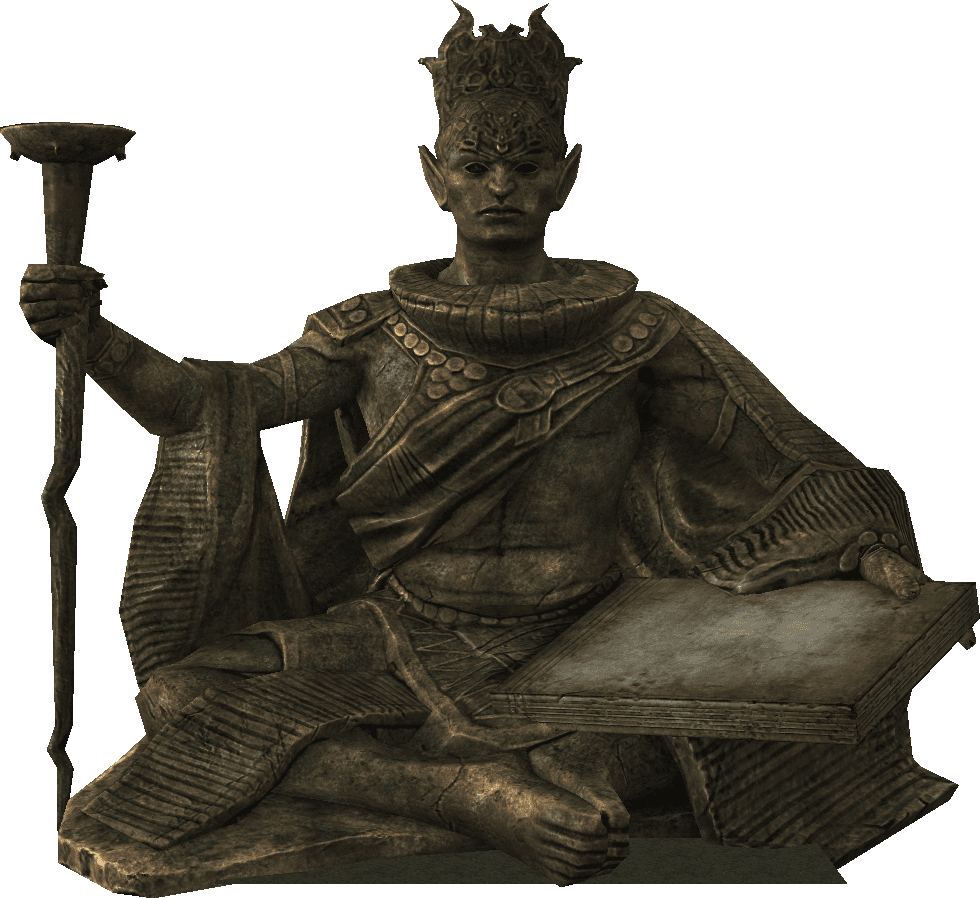 Skyrim Skyrim
|
The Lady in the Cistern[edit] | |
|
The Lady in the Cistern was the name given to a mysterious statue found hidden away in the sewers under Abah's Landing in Hew's Bane. When the sewers became the headquarters of the Thieves Guild during the mid-Second Era, the statue of the unknown woman with a serpent coiled around her was discovered hidden in a cistern that was once bricked off behind another cistern.[22] It remained unknown to the guild who she represented or why the statue was built there, but guild members had numerous theories. These included Nocturnal,[22] the Lucky Old Lady statue in Bravil,[23] the Night Mother (and the snake wrapped around her representing Sithis)[24] Hazadiyya Sea-Queen (wrapped in a sea serpent)[25] or Zeqqi, the Madonna of Tears.[26] Another theory was it represented the Yokudan goddess Leki administering her Ephemeral Feint, given this was how sculptors would depict it during early First Era, and also that it bore similarities to the enormous statue of Prince Hubalajad south of the Abah's Landing's harbor. It was speculated that the sculptor who hid Leki's modest statue away in the cistern did so to spite Prince Hubalajad and his achievements.[27] |
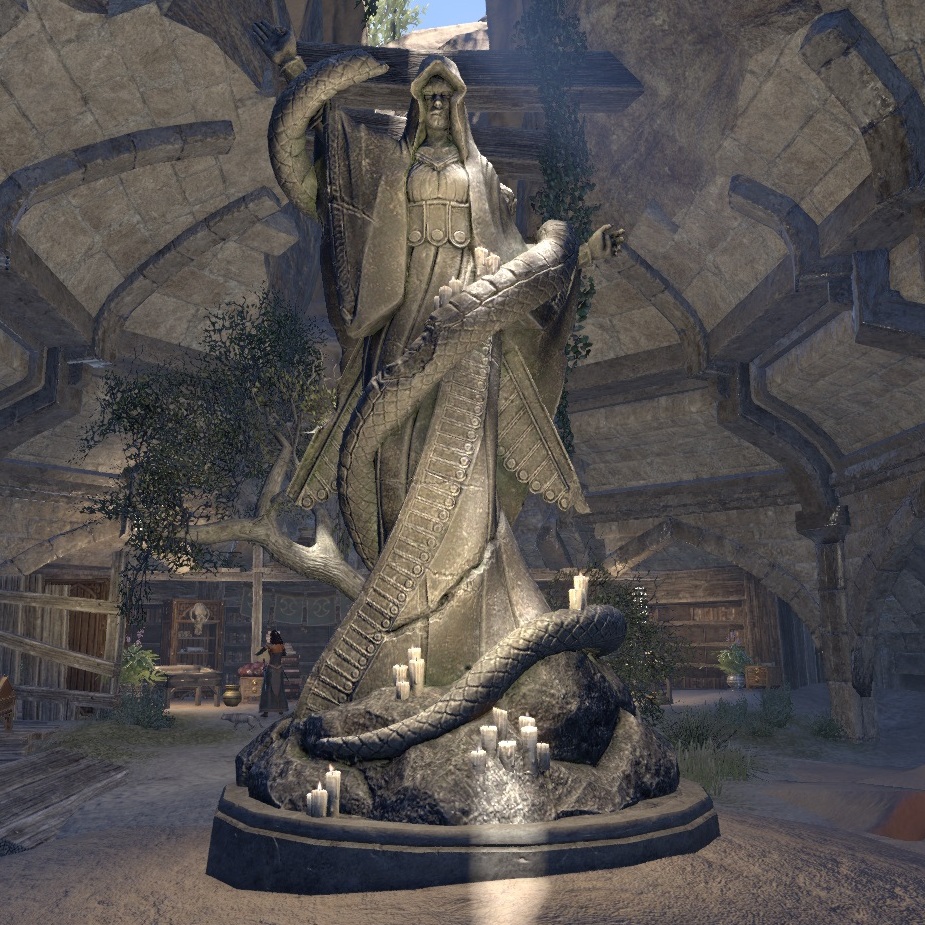 ESO ESO
|
Leki's Blade[edit] | |
|
According to legend, the enormous statue of a hand holding aloft a broken sword in the middle of the Alik'r Desert dates back to a mythical duel in ancient times. In the early First Era, a great Yokudan Ansei warrior named Rada al-Saran traveled to the surrounding oasis, claiming to match the gods in the way of the sword. Here he met the Yokudan goddess Leki, who had taken the shape of a warrior of sand, wielding a blade of the hardest rock. Some say that Leki herself drew him to the school to challenge and humble him. Rada al-Saran bowed to his opponent, and when it bowed back, he knew found an opponent worthy of his skill. For three days and three nights, they dueled with neither gaining the upper hand. Rada al-Saran was becoming tired from fighting, so in a last-ditch attempt he struck the weak point of Leki's sword. The blade broke in two, and a great sandstorm split the horizon. When it cleared, Leki had miraculously erected a shrine from the sands, and the surrounding oasis was said to have held the purest water in all Alik'r. A training school was later founded beneath the shrine and was open to students until at least the mid-Second Era.[28] |
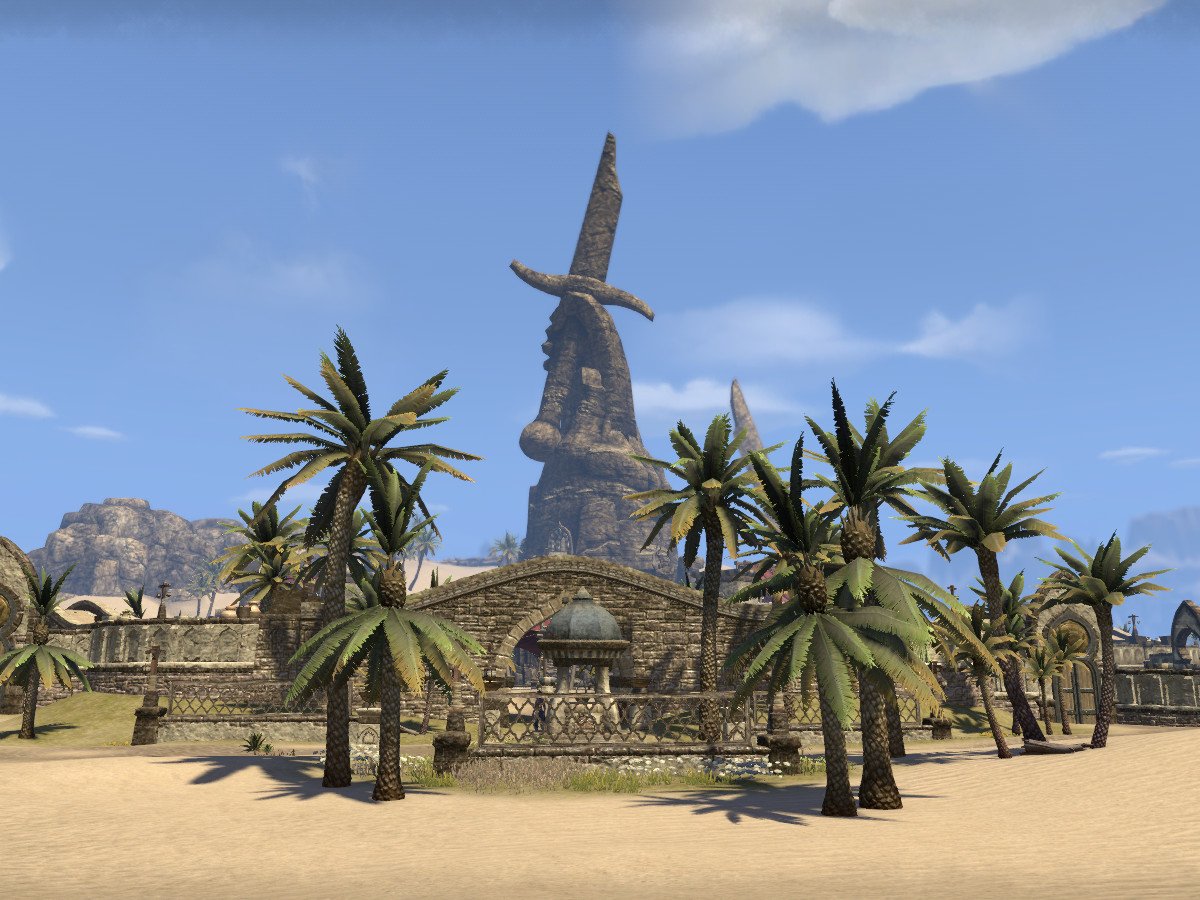 ESO ESO
|
Mermaid of Anvil[edit] | |
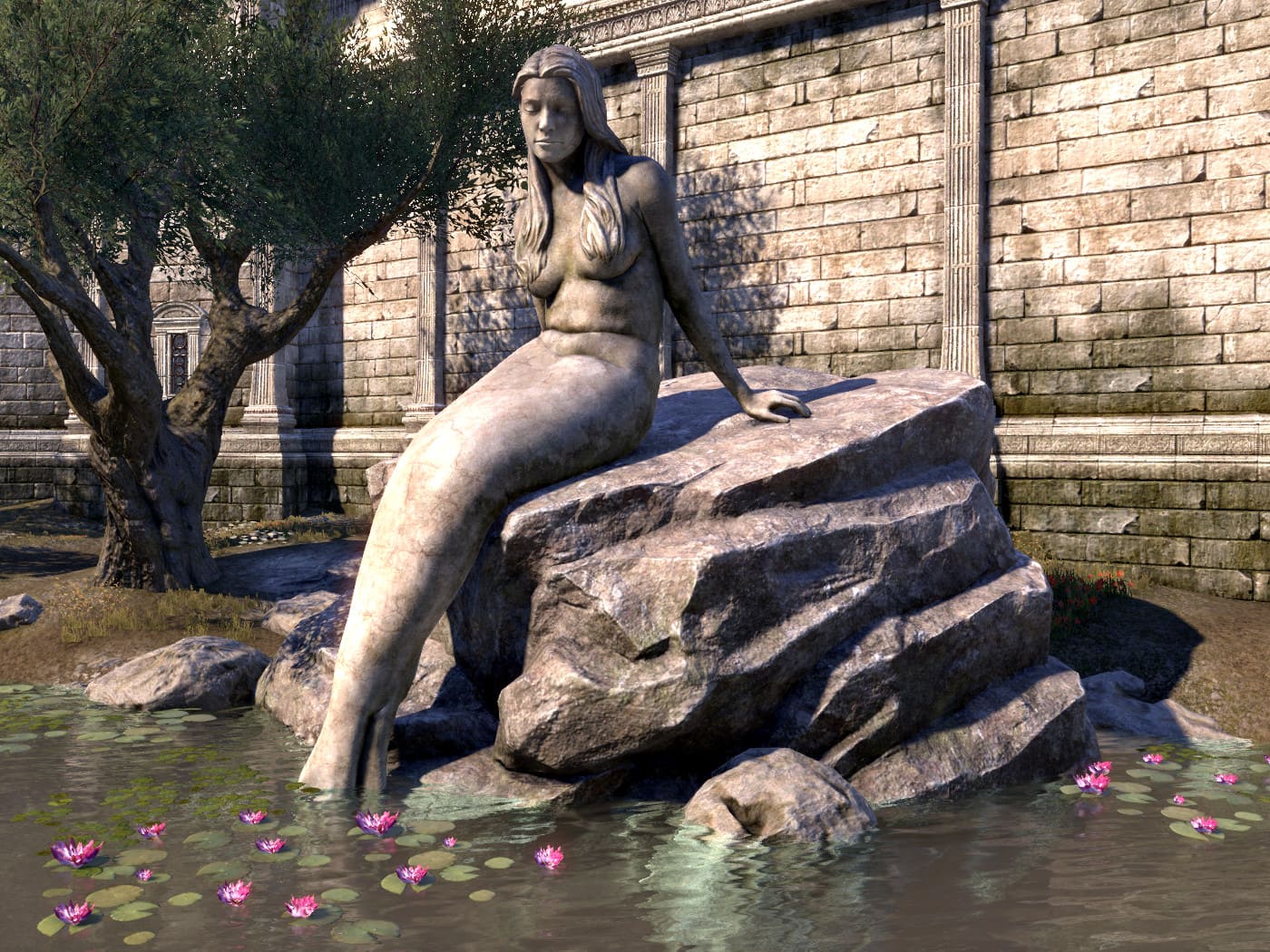 ESO ESO
|
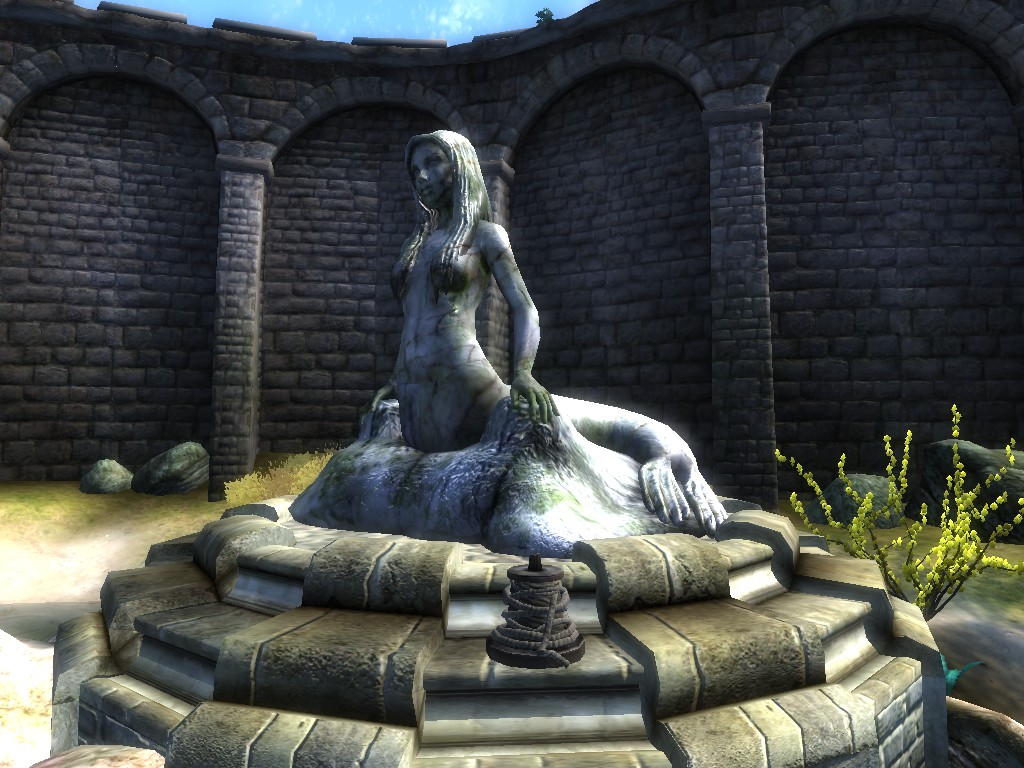 Oblivion Oblivion
|
|---|---|
|
A large statue of a mermaid can be found in Guildgate district in Anvil. With no inscription decorating its base and no certificate of origin stored in the city records, the statue remains a blank canvas upon which locals and visitors alike have painted their own picture. Its known commonly as the Brine Maiden, the Leggy Lass, the Salty Serenader, the Stone Seductress[29] or the Selkie of West Skerry.[30]:353 Legends surrounding its origins are numerous, some believe it to be based on a long-forgotten deity, while others claim that it depicts Azura as she appeared to some ancient sea-dwelling civilization. In another legend regarding the statue, it is said she was a kind seal-maid that she would guide sailors through the dense fog around the Gold Coast.[30]:353 Archaeological studies indicate that it pre-dates any structure in Anvil, suggesting that the city was possibly built around her.[29] On High Isle, small Ebony mermaid figurines were a common fertility idol among commoners.[31] | |
The Sentinel[edit] | |
|
The Sentinel is an ancient statue found northeast of Bruma in Cyrodiil. It is unknown who built the large statue that faces north towards Skyrim. Earliest known accounts appear in Akaviri reports during their invasion in 1E 2703, when it was used by them as a waypoint to find the path to their hidden base in Pale Pass.[32] The Sentinel was once more used as a waypoint by the Hero of Kvatch to recover the Draconian Madstone from Fort Pale Pass.[33] |
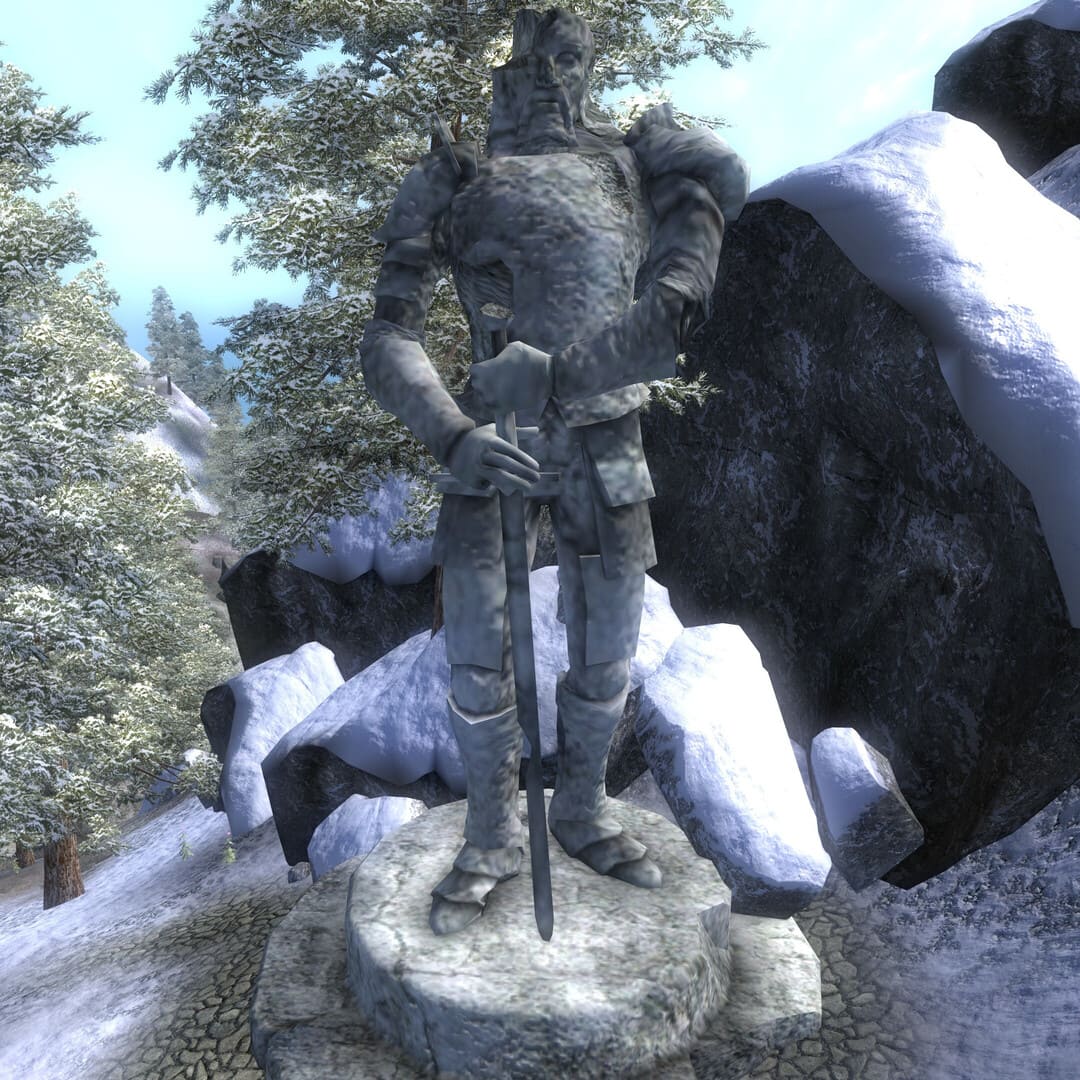 Oblivion Oblivion
|
The Skyforge[edit] | |
|
Above the Skyforge sits an ancient statue of a hawk or eagle overlooking the city of Whiterun. According to Nordic myth, it dates back to the Merethic Era when the Atmorans first settled Skyrim. It was discovered when the crew of Jorrvaskr arrived on the plains of Whiterun Hold. The band's elven captives looked at the statue with fear and claimed that it predated the elven habitation of Skyrim. They didn't know who built it, but it was known to drive a magic almost as old as Nirn itself, described as some remnant of the gods' efforts to render a paradise in Mundus before the shattering of Lorkhan.[34] |
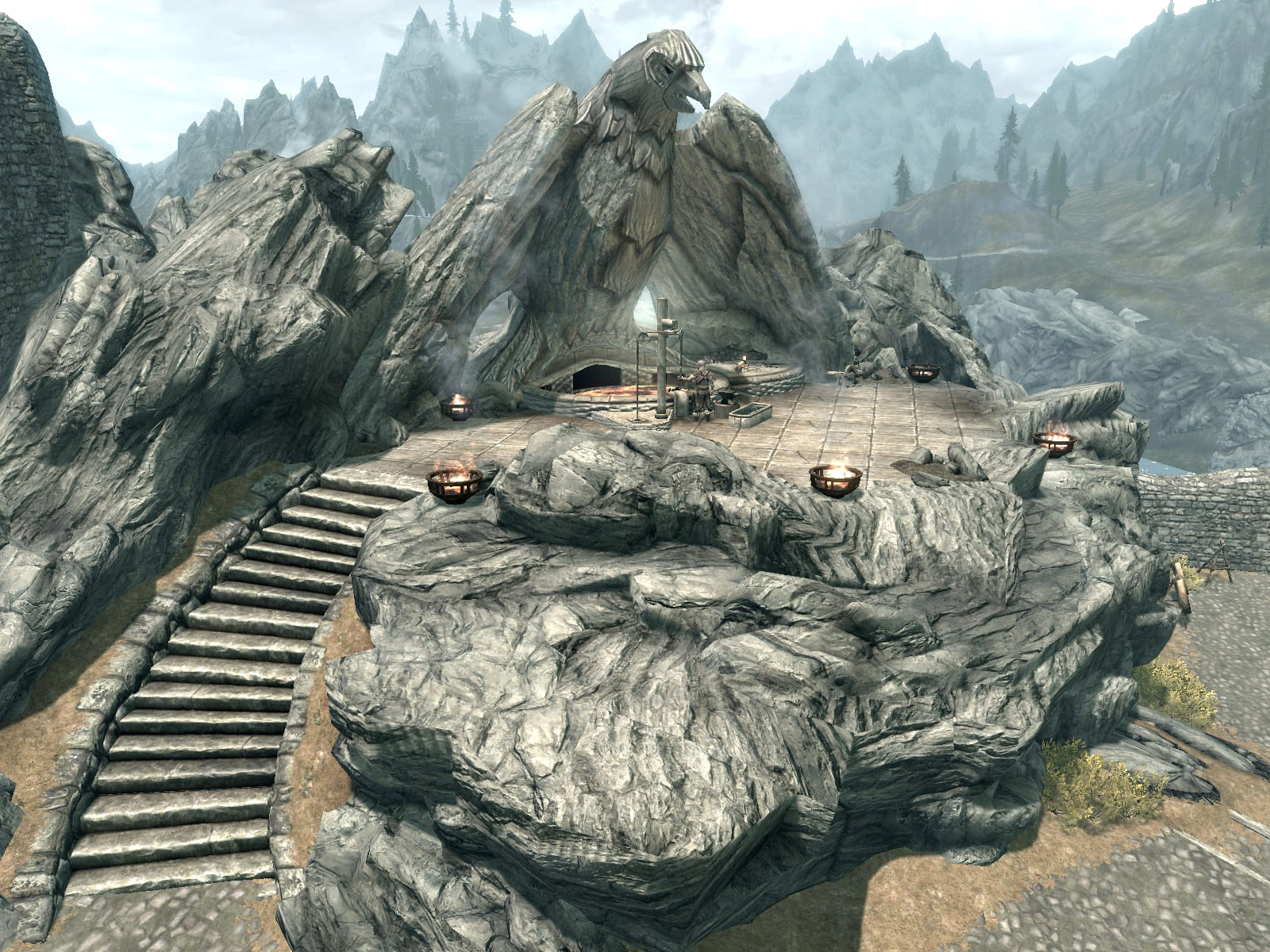 Skyrim Skyrim
|
Standing Stones[edit] | |
|
Throughout the wilderness of Tamriel lie various types of standing stones, stones of power which are often attuned to the heavens. The origins of these stones are a mystery for the most part, but they have been known to grant great power to those deemed worthy enough. |
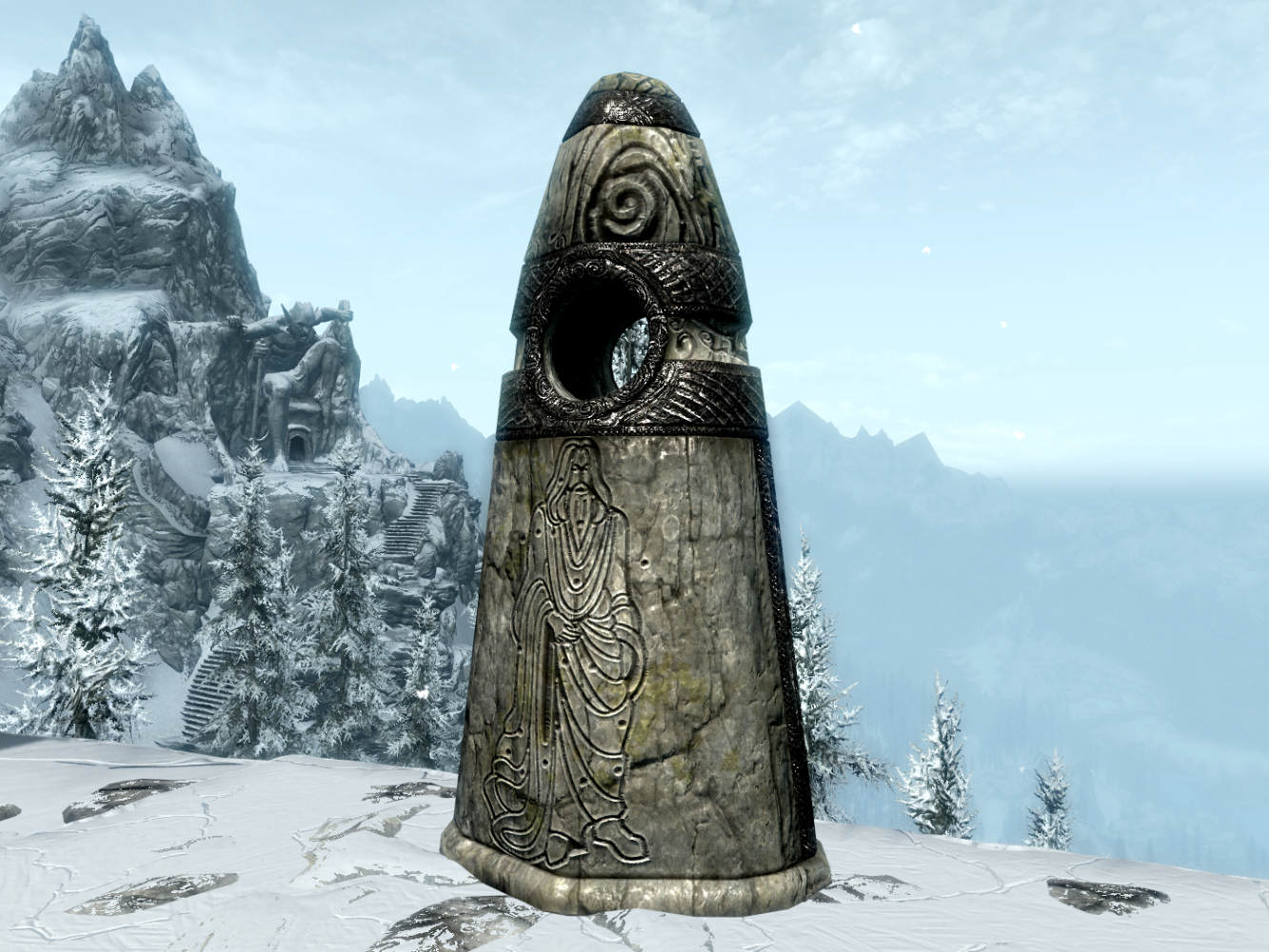 Skyrim Skyrim
|
Ten Ancestors[edit] | |
|
The Ten Ancestors are a set of ten Ayleid statues. They consist mostly of meteoric iron prongs, with a shard of meteoric glass in the center. The statues played an important role in Ayleid religion and were displayed in the Temple of the Ancestors, now known as the White-Gold Tower.[35] During the Alessian Slave Rebellion, the Ancestors were dispersed to cities across Cyrodiil for safekeeping. Following the sacking of White-Gold and the Ayleid exodus of Cyrodiil, the statues were left behind and forgotten.[35] In 3E 433, an Altmer nobleman called Umbacano paid the Hero of Kvatch to hunt down the Ten Ancestors so that he could add them to his collection of Ayleid antiquities. He then put them on display in his private manor in the Imperial City, before his untimely death that same year while exploring the ruins of Nenalata.[36] |
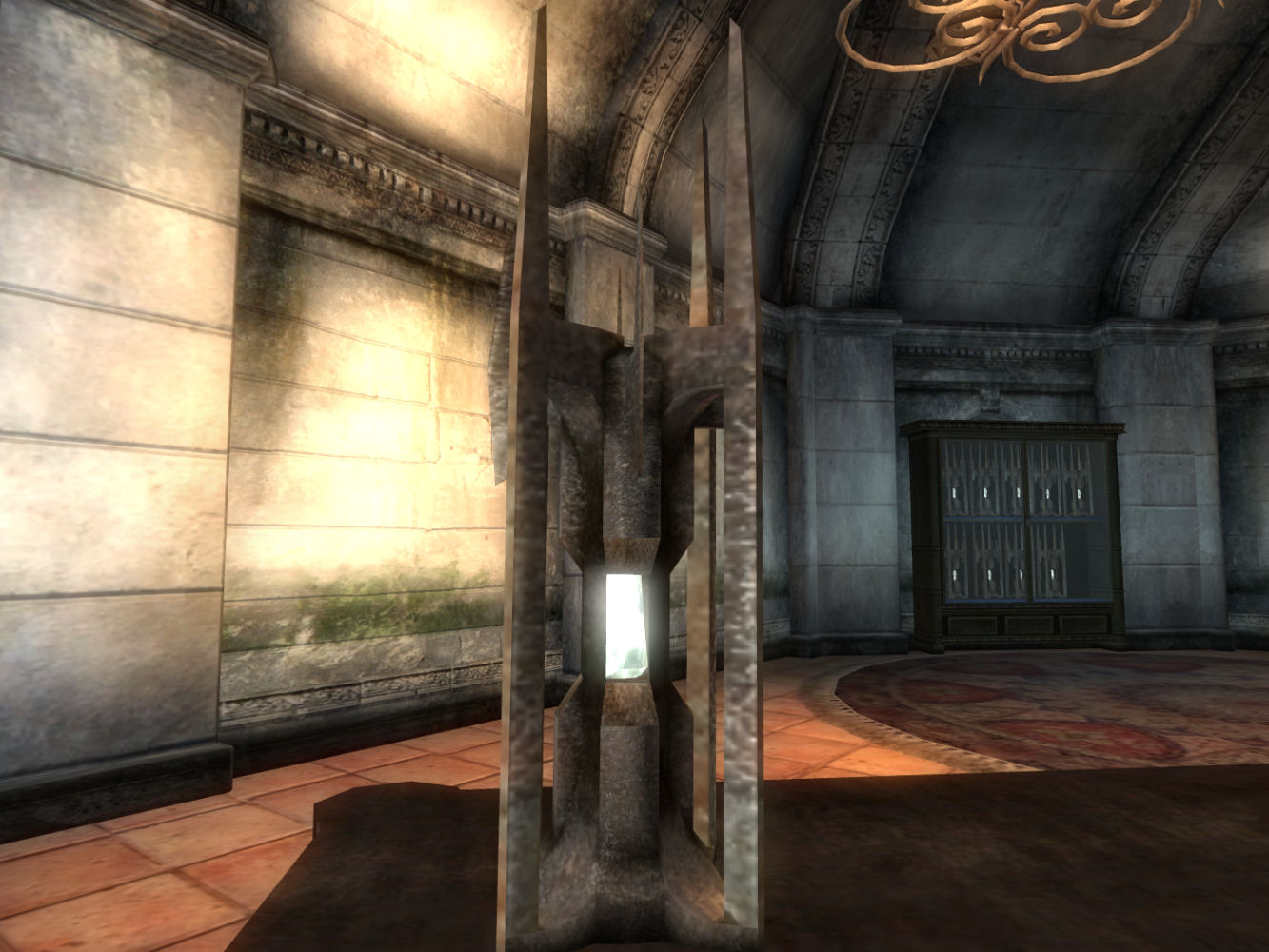 Oblivion Oblivion
|
Weeping Giant[edit] | |
|
The Weeping Giant is an enormous ruined statue head found in eastern Stormhaven. Seemingly carved from the mountain itself, it is unknown when it was built or by whom. During the mid-Second Era a shrine to Azura was built nearby and the area around the statue was inhabited by the Supernal Dreamers, a cult of Vaermina worshippers.[37] When the Staff of Towers was drawn back to Tamriel, it shattered and the pieces scattered across the continent. One such fragment was found atop the statue and recovered by the Psijiic Order.[38] Curiously, a similar, upright statue head was built on the other side of the Tamriel, at the summit of Direfrost Keep in Skyrim.[39] |
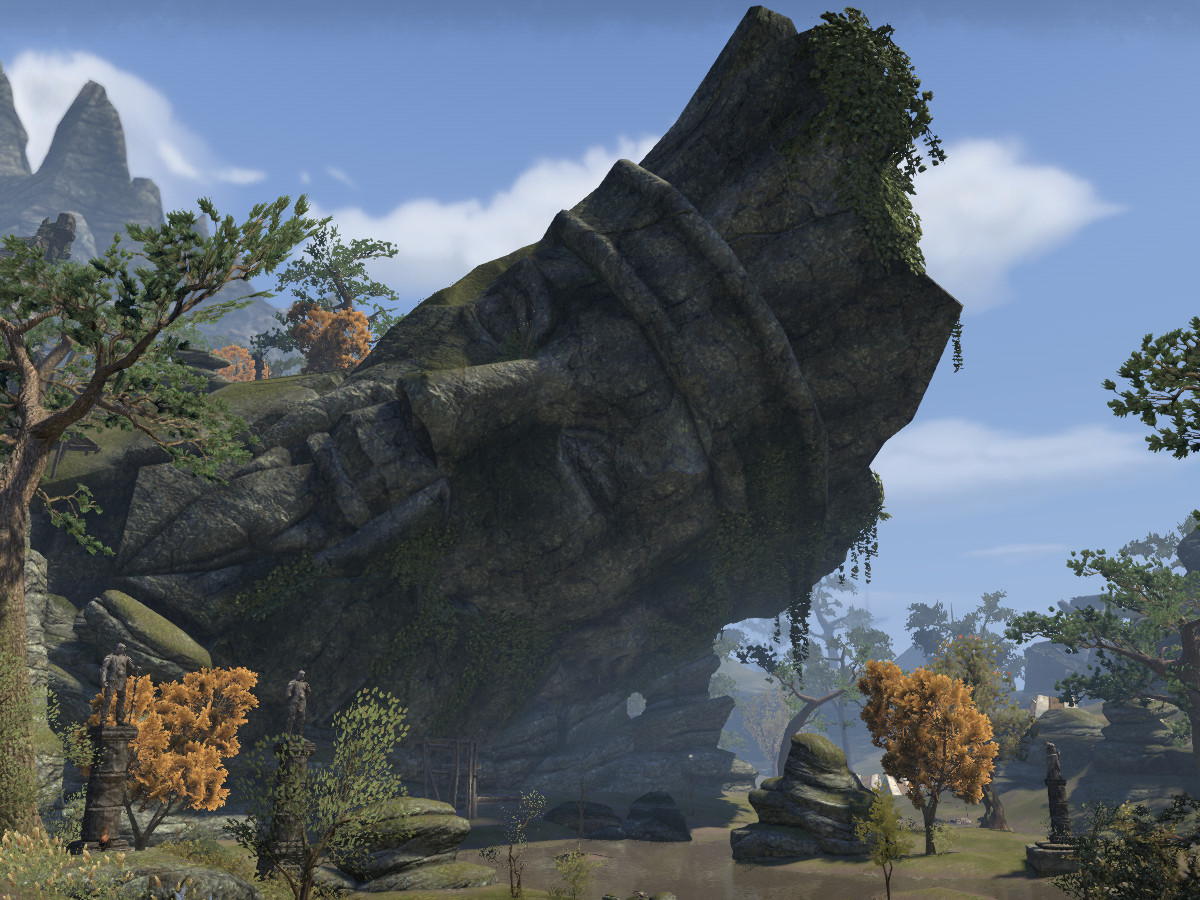 ESO ESO
|
References[edit]
- ^ a b Esbern's dialogue in Skyrim
- ^ Alduin's Wall quest in Skyrim
- ^ Annals of the Dragonguard — Brother Annulus
- ^ Alduin's Wall quest in Skyrim
- ^ Battle of the Bones Memorial
- ^ The Improved Emperor's Guide to Tamriel: Skyrim — Flaccus Terentius, 2E 581
- ^ Hallfrida's dialogue in ESO
- ^ a b Broken Statue's dialogue in ESO
- ^ Statue outside Fanacasecul in Oblivion
- ^ Sorcerer Vunal's dialogue in ESO
- ^ The Brothers of Strife — Nili Omavel
- ^ Window on the Past quest in ESO
- ^ Brothers of Strife Sculpture treasure item in ESO
- ^ Brothers of Strife Gemstone Bookends treasure item in ESO
- ^ Appearance of statue in Oblivion
- ^ Guide to Western Skyrim: Haafingar — Imperial Surveyor Buntara Gravius
- ^ Aelvyd's dialogue in ESO
- ^ Loading screen in Skyrim
- ^ Thief's Last Words
- ^ Delvin Mallory's dialogue in Skyrim
- ^ Blindsighted quest in Skyrim
- ^ a b Lady in the Cistern: Thrag's Theory — Thrag
- ^ Lady in the Cistern: Andarri's Theory — Andarri
- ^ Lady in the Cistern: Velsa's Theory — Velsa
- ^ Lady in the Cistern: Quen's Theory — Quen
- ^ Lady in the Cistern: Walks-Softly's Theory — Walks-Softly
- ^ Lady in the Cistern: Zeira's Theory — Zeira
- ^ Rahama's dialogue in ESO
- ^ a b The Mysterious Mermaid of Anvil
- ^ a b The Elder Scrolls IV: Oblivion Official Game Guide — Peter Olafson — "Statue—The Selkie of West Skerry: This sealmaid's lover stole the selkie's seal skin, hoping to keep her from leaving him for the sea, but the lover's wife had secretly cut the skin in two, leaving one part so the selkie might find it. The selkie donned her partial skin and discovered herself neither seal nor maid, but half seal and half maid. She fled the land but is said to guide lost mariners to land in the dense fogs of the Gold Coast."
- ^ Ebony Mermaid Figurine treasure item in ESO
- ^ Akaviri Diary Translation — Xhaferi
- ^ Lifting the Vale quest in Oblivion
- ^ Songs of the Return, Vol 7
- ^ a b Umbacano's dialogue in Oblivion
- ^ The Collector quest in Oblivion
- ^ Azura's Relics quest in ESO
- ^ The Psijic Order questline in ESO: Summerset
- ^ Statue in Direfrost Keep